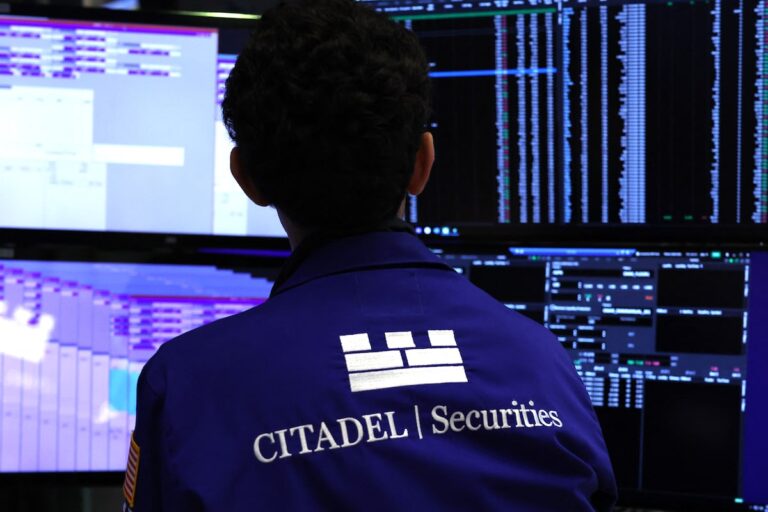Global stocks were subdued and the dollar was flat on Tuesday as market enthusiasm about Washington and Beijing extending their tariff truce to November was tempered by jitters about U.S. inflation data later in the day.
Asian equities rallied after U.S. President Donald Trump signed an executive order overnight pausing triple-digit levies on Chinese imports for another 90 days.
That propelled Tokyo’s exporter-heavy Nikkei to an all-time peak, while European stocks nudged higher, as Trump’s latest tariff climbdown allayed fears about China flooding non-U.S. markets with cheap goods to keep its factories humming.
But the upcoming U.S. CPI data was more important to the direction of markets, investors said, because it comes just after a surprisingly weak jobs report on August 1 and as businesses increasingly report inflationary pressures.
“If we see an inflation print that is above consensus that is going to make it very difficult for the Federal Reserve to cut interest rates,” Foresight Group fund manager Mayank Markanday said.
“We are probably going to see more data validating fears that (U.S.) stagflation is a key risk,” he added, referring to an economic scenario of slowing growth and rising inflation that has not been prevalent in the U.S. since the 1970s.
Investors are currently pricing in at least two rate cuts in 2025, adding to pressure on the dollar, which has also been weighed down by policy uncertainty and Trump’s personal attacks on Federal Reserve Chair Jerome Powell for keeping monetary policy tight.
Futures trading in New York signalled the S&P 500 share index and the tech-heavy Nasdaq 100, which are both near record highs thanks to rate cut bets and strong tech earnings, would trade steadily ahead of the CPI print .
A gauge tracking the dollar’s progress against major currencies including the euro and Japan’s yen traded flat on Tuesday, with sterling and the euro also little moved on the day.
The pound rose 0.4 per cent against the Australian dollar, however, as traders anticipated the Bank of England lagging behind other non-U.S. central banks in implementing rate cuts.
The Reserve Bank of Australia cut its main cash rate by a quarter point to a two-year low of 3.60 per cent on Tuesday.
Hours later, official UK labour data showed that British earnings growth was still running at 5 per cent, two percentage points above the level economists view as consistent with the Bank of England’s inflation goal and despite an economic slowdown.
The BoE cut benchmark borrowing costs by a quarter point to 4 per cent last week after a tightly balanced vote between members of its monetary policy committee, who also broadly agreed that the risks of an upward wages-and-prices spiral remained present.
China’s blue-chip stocks rose 0.5 per cent on Tuesday and Australian shares also gained.
The U.S. and China have engaged in a tit-for-tat tariff duel throughout the year, culminating in trade talks in Geneva, London and Stockholm since May that focused on bringing tariffs down from triple-digit levels.
Chinese exports jumped 7.2 per cent year-on-year in July, beating the consensus forecast of economists polled by Reuters, but the nation’s factory gate prices dropped by the most in two years in a further sign of manufacturers struggling to sell goods at home.
The latest truce extension also cleared the way for investors to focus on how inflationary U.S. trade levies implemented so far have been and the potential for rising prices to keep the Fed on hold and exacerbate pressure on Powell.
Trump has nominated White House advisor Stephen Miran to temporarily fill a vacant board seat at the U.S. central bank,
stirring up speculation
about presidential interference in monetary policy.
U.S. Treasuries were little moved on Tuesday ahead of the consumer prices data, with benchmark yields flat at around 4.279 per cent and those on two-year notes, which track interest rate expectations, one basis point (bp) higher at 3.764 per cent.
UK 10-year gilt yields added four bps to 4.609 per cent as Tuesday’s wage data raised inflation expectations and swept some rate cut bets out of British fixed-income markets.
In commodities, spot gold prices edged up to $3,352 after dropping nearly 1.6 per cent on Monday in response to Trump announcing there would be no tariffs on imported gold bars.
Oil was modestly higher ahead of the August 15 meeting between Trump and Russian President Vladimir Putin, aimed at negotiating an end to the war in Ukraine.
The talks follow increased U.S. pressure on Russia, raising the prospect of penalties on Moscow if a peace deal is not reached. Elsewhere, cryptocurrency bitcoin was modestly lower at US$118,680 while ethereum rose by 1 per cent to US$4290.
Reuters
